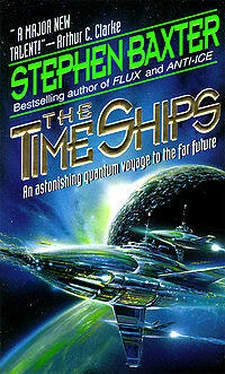We had come to a halt and stood nose to nose.
“Gentlemen,” Nebogipfel said. “Is this the time for such navel-gazing?”
Moses and I stared at the Morlock, and at each other. In Moses’s face, I saw a sort of vulnerable fear which he masked with this anger — looking into his eyes was like peering into a cage at a terrified animal — and I nodded at him, trying to transmit reassurance.
The moment passed, and we moved apart.
“Of course,” I said in an attempt to break the tension, “you never do any navel-gazing, do you, Nebogipfel?”
“No,” the Morlock said easily. “For one thing I do not have a navel.”
We hurried on. We reached the central office block and set off in search of Wallis’s room. We moved through carpeted corridors, past rows of brass-plated doors. The lights were still burning — I imagined the College had its own, secured supply of electricity and the carpet deadened our footsteps. We saw no one about. Some of the office doors were open, and there were signs of hasty departure: a spilled cup of tea, a cigarette burning down in an ash tray, papers scattered across floors.
It was hard to believe that carnage reigned only a few dozen yards away!
We came to an opened door; a bluish flicker emanated from it. When we reached the doorway, the single occupant — it was Wallis — was perched on the corner of the desk. “Oh! it’s you. I’m not sure I expected to see you again.” He wore his wire spectacles, and a tweed jacket over a woolen tie; he had one epaulet attached and his gas-mask on the desk beside him; he was evidently in the midst of preparations to evacuate the building with the rest, but he had let himself be distracted. “This is a desperate business,” he said. “Desperate!” Then he looked at us more closely — it was as if he was seeing us for the first time. “Good God, you’re in a state!”
We moved into the room, and I could see that the blue flickering came from the screen of a small, glass-fronted box. The screen showed a view down a stretch of river, presumably the Thames, in rather grainy detail.
Moses leaned forward, with his hands on his knees, the better to see the little set. “The focus is pretty poor,” he said, “but it’s quite a novelty.”
Despite the urgency of the moment, I too was intrigued by the device. This was evidently the picture-carrying development of the phonograph which Filby had mentioned.
Wallis snapped a switch on his desk, and the picture changed; it was the same in its broad details — the river, winding through built-over landscape — but the lighting was a little brighter. “Look here,” he said, “I’ve been watching this film over and over since it happened. I really can’t quite believe my eyes… Well,” he said, “if we can dream up such things, I suppose they can too!”
“Who?” Moses asked.
“The Germans, of course. The blessed Germans! Look: this view is from a camera fixed up at the top of the Dome. We’re looking east, beyond Stepney you can see the curve of the river. Now: look here — in she comes—”
We saw a flying machine, a black, cross-shaped craft, sweeping low over the shining river. It came in from the east.
“You see, it’s not easy to Bomb a Dome,” Wallis said. “Well, that’s the point, of course. The whole thing’s pretty much solid masonry, and it’s all held together by gravity as much as by steel; any small breaches tend to heal themselves…”
Now the flying machine dropped a small package towards the water. The image was grainy, but the package looked cylindrical, and it was glinting in the sunlight, as if spinning as it fell.
Wallis went on, “The fragments from an air-burst will simply hail off the concrete, by and large. Even a Bomb placed, somehow, directly against the face of the Dome won’t harm it, in ordinary instances, because so much of the blast goes off into the air — do you see?
“But there is a way. I knew it! The Rota-Mine — or Surface Torpedo… I wrote up a proposal myself, but it never progressed, and I had no energy — not with this DChronW business as well… Where the Dome meets the river, you see, the carapace extends beneath the surface of the water. The purpose is to keep out attack by submersibles and so forth. Structurally the whole thing is like a dam.
“Now — if you can place your Bomb against the part of the Dome beneath the water…” Wallis spread his large, cultured hands to mime it. “Then the water will help you, you see; it contains the blast and directs the energy inward, into the structure of the Dome.”
On the screen, the package — the German Bomb — struck the water. And it bounced, in a mist of silvery spray, and leapt on, over the surface of the water, towards the Dome. The flying machine tipped to its right and swept away, quite graceful, leaving its Rota-Mine to stride on towards the Dome in successive parabolic arcs.
“But how to deliver a Bomb, accurately, to such an inaccessible place?” Wallis mused. “You can’t simply drop the thing. Sticks end up scattered all over the shop… If you drop a mine even from a modest height of, say, fifteen thousand feet, a crosswind of just ten miles an hour will create two hundred yards’ inaccuracy.
“But then it came to me,” he said. “Give it a bit of back-spin, and your Bomb could bounce over the water — one can work out the laws of ricochet with a bit of experiment and make it all quite accurate… Did I tell you about my experiments at home on this subject, with my daughter’s marbles?
“The Mine bounces its way to the foot of the Dome, and then slides down its face, under the water, until it reaches the required depth… And — there it is. A perfect placement!” He beamed, and with his shock of white hair and those uneven glasses, he looked quite avuncular.
Moses squinted at the imprecise images. “But this Bomb looks to me as if it’s going to fail… Its bounces will surely leave it short… ah.”
Now a plume of smoke, brilliant white even in the poor image, had burst from the back of the Rota-Mine: The Bomb leapt across the water, as if invigorated.
Wallis smiled. “Those Germans — you have to admire them. Even I never thought of that little wrinkle…”
The Rota-Mine, its rocket-engine still blazing, passed beneath the curve of the Dome and out of sight of the camera. And then the image shuddered, and the screen filled with a formless blue light.
Barnes Wallis sighed. “They’ve done for us, it looks like!”
“What about the German shelling?” Moses asked.
“The guns?” Wallis scarcely sounded interested. “Probably hundred-and-five-mil Light-Gun 42s, dropped in by paratroop units. All in advance of the Invasion by Sea and Air that’s to follow, I don’t doubt.” He took off his glasses and began to polish them on the end of his tie. “We’re not finished yet. But this is a desperate business. Very bad indeed…”
“Dr. Wallis,” I said, “what about Gödel?”
“Hum? Who?” He looked at me from large, fatigue-rimmed eyes. “Oh, Gödel. What about him?”
“Is he here?”
“Yes, I should think so. In his office.”
Moses and Nebogipfel made for the door; Moses indicated, urgently, that I should follow. I held up my hand.
“Dr. Wallis — won’t you come with us?”
“Whatever for?”
“We might be stopped before we reach Gödel. We must find him.”
He laughed and thrust his glasses back over his nose. “Oh, I don’t think security and any of that matters very much any more. Do you? Anyway — here.” He reached up to his lapel and tugged free the numbered button that was clipped there. “Take this — tell them I’m authorizing you — if you meet anyone mad enough to be at his post.”
Читать дальше
Конец ознакомительного отрывка
Купить книгу









